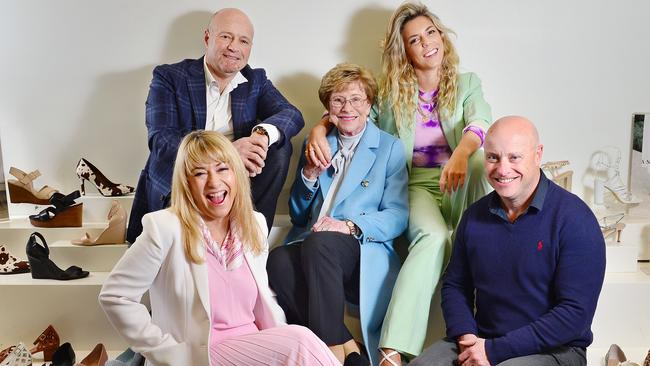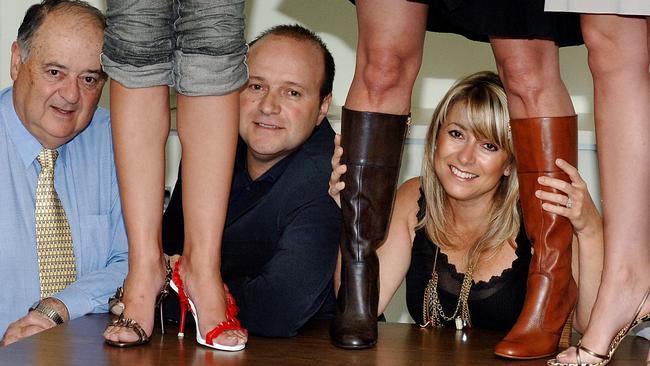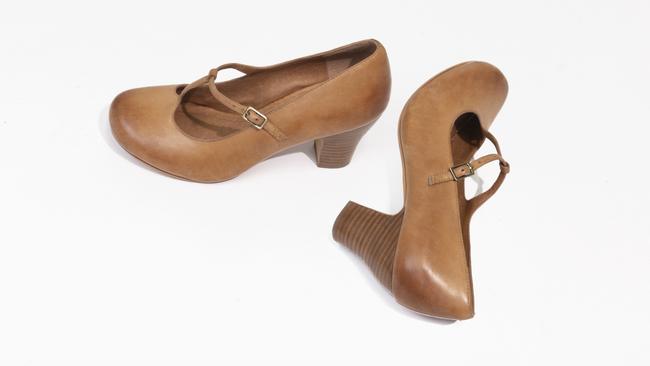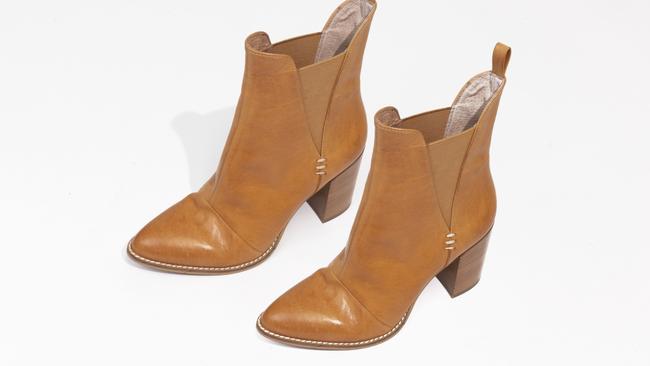Melbourne shoe business Wittner survived depressions, recessions and online shopping
For more than a century, the Wittner family has made shoes for fashionable feet. Now with the next generations at the helm, they plan on continuing the tradition despite the tough retail climate.
Lifestyle
Don't miss out on the headlines from Lifestyle. Followed categories will be added to My News.
Buy a pair of Wittner shoes and you’ll find the Melbourne family’s signature on every pair — literally and figuratively.
One of Australia’s last wholly family-owned retail companies, the business will celebrate its 107th anniversary on Thursday.
Second-generation CEO David Wittner, who took over from his founder father Hyman, hand-drew the Wittner logo which remains today. David’s wife Rosette, once the handbag buyer for the business, recently added “with love”, which is now inscribed on each pair of special-occasion shoes.
It’s these personal touches and attention to detail that have helped keep the business afloat through depressions, recessions and the current onslaught of online shopping.
Following the death of David at 84 in January last year, the company is now in third and fourth-generation hands, with David’s daughter Debbie, 59, and sons Michael, 58, and Peter, 55, as well as Debbie’s daughter Lucy, 29, at the helm.
“We all had retail as part of our lives growing up, it was always discussed at the table,” Debbie says.
“We’d always worked part-time in the stores, and I’d worked since I was 14 on Friday nights and Saturday mornings.”

But it wasn’t an easy walk-in for the offspring to take on bigger roles in the business given their father David’s strict succession plan.
“Dad had a philosophy that he wanted all of us to have experience overseas, so we all packed a backpack and went off overseas at different stages,” Debbie says.
Michael says processes are also in place to ensure fairness and the business runs as smoothly as possible within the family.
“We set up a family constitution so we have a family council which we involve the next generation in. Those processes we have put in place have been beneficial to the company as a whole,” he says.
“Our family constitution requires the next generation to work a minimum of two years elsewhere in an equivalent position at another business, but they can all work in a store.”
Each family member has held different roles within the company, but currently Debbie is in charge of marketing, Michael heads up digital, Peter is the CEO and Lucy is a designer.
“That’s all due to my Dad,” Debbie explains.
“We used to call him the lion tamer. What he instilled in us was that it’s OK to agree to disagree, to disagree agreeably. In all our decisions we know we are going to win some and lose some.
“All major decisions are put to majority vote and we respect that. He instilled in us a respect of not getting what you want all the time.”
Mothers and daughters can be the fiercest friends and also clash at times, but Lucy and Debbie are grateful the business has brought them together professionally.
“You could definitely say it’s challenging at times, because I have to often remember that I’m in a professional environment and I can’t address her like I would at home,” Lucy says.
“But for the most part, it’s rewarding. Over the last four years, I‘ve been fortunate enough to be in her presence at work and have a whole new appreciation for her and what she does.
“I’ve learnt so much from watching her go about business matters and being essentially a total boss woman.
“She inspires me every day from her work ethic, her determination, her strength and talents.”
Lucy also began her Wittner journey working in a store before studying fashion design at RMIT.
“I was born into this business, quite literally. My foot is a perfect 37, that’s the sample size. So I say I was born into this role — I’m the fit-test model as well as the designer,” she says.
“Since the age of 13 and nine months, because if it’s a family business you can start working the year before, so I believe, they put me into the stores. I worked in the stores for 12 years so it was just in my nature and then my teachers at university said, ‘You’re going to be following in your mum’s footsteps’.

“I was like, ‘No, I want to do my own thing’. I did styling as a side job and then the opportunity came about when one of the designers left, so I applied for it and I said, ‘Treat me like normal’ and they did and I got it.”
The footwear business has evolved dramatically since Hyman opened his first store in Footscray in September 1912.
The innovative businessman was the first to introduce mail-order shopping to customers in 1920. He even hand-illustrated each of the shoes available in the seasonal catalogues produced over 36 years.
“We were the first footwear retailer to have an e-commerce website in 1999, also the first in the ’20s to have a footwear catalogue business,” Michael says.
“Innovation has been our mantra and pillar and we’re starting to accelerate that again.”
Innovation and product quality has been a key reason for the brand’s ongoing success, however, the family admits the business hasn’t been immune to the challenging retail climate.
They currently have about 500 staff and 100 outlets, including 30 concession stores in David Jones. But there are plans to reduce bricks-and-mortar stores by 10 to 20 per cent over the next few years as online sales grow.
READ MORE LIFESTYLE:
TIFFINY HALL AND HUBBY ED KAVALEE TEAM UP FOR KID’S BOOK
WHAT TO DO WHEN KIDS NEVER LEAVE HOME
LOCAL AUTHOR QUIT WRITING, THEN SIGNED A SIX-FIGURE DEAL
“Retail is very challenging at the moment,” Debbie says. “Not only have we gone through a digital disruption, we’ve gone through the athleisure disruption. Everyone is wearing sneakers and I get it, I’m wearing them, too.
“When you get your foot into a sneaker, it’s very hard to get out of it because it’s so comfortable.
“One of our things today is not only to drive fashion and trend-driven product, but also comfort and quality that lasts.
“There is also the Marie Kondo effect taking place and people don’t want to buy so much fast fashion because it’s landfill and waste, so it’s about buying quality that lasts. We’re leather inside and out and there’s not many shoe companies that do that.”
Michael says while there are automation processes involved in the manufacture of their footwear, every element of a shoe is still touched by hand.
Hyman and David’s legacy is important to the current Wittners running the company and has instilled in them a deep love of and appreciation for the business, which permeates to everyone who works for them.
“We’ve had people who have worked with us for 30 or 40 years,” Michael says.
“When we talk about the family we’re talking about everyone, not just the immediate family members.”
FIVE BEST-SELLING STYLES
ASTER (2014)
A revival of an older style, the Aster pays homage to the brand’s designs from the 1920s and 1930s. The signature heel andbuckle fastening are reminiscent of the fashions of this era, which have become so classic they’ve been carried into the next century.

FLORINDA (2012)
This sparkly, strappy style was a standout in Wittner’s super-glam Centenary Collection celebrating 100 years of the brand,all with glittering details and elevated silhouettes.
HONESTY (2017-NOW)
This leather ankle boot is one of Wittner’s most enduring designs to date. Always a bestseller, it comes in black and tanand fits seamlessly into a modern woman’s wardrobe.

LENTE (2017)
This limited-edition heel formed part of The Art of Style: Wittner x The NGV collection. The partnership with the galleryacknowledged the brand’s Melbourne roots and the range was inspired by the van Gogh exhibition at the time and the iconicartist’s love of nature.
SONIA (1998)
Made from Italian leather, this super-popular sandal showcased two trends of the late ‘90s — the square toe and the blockheel. Into the noughties, the block heel gave way to the short stiletto named the kitten heel, however, colourful square-toeslides like this are back in a big way for this summer.
